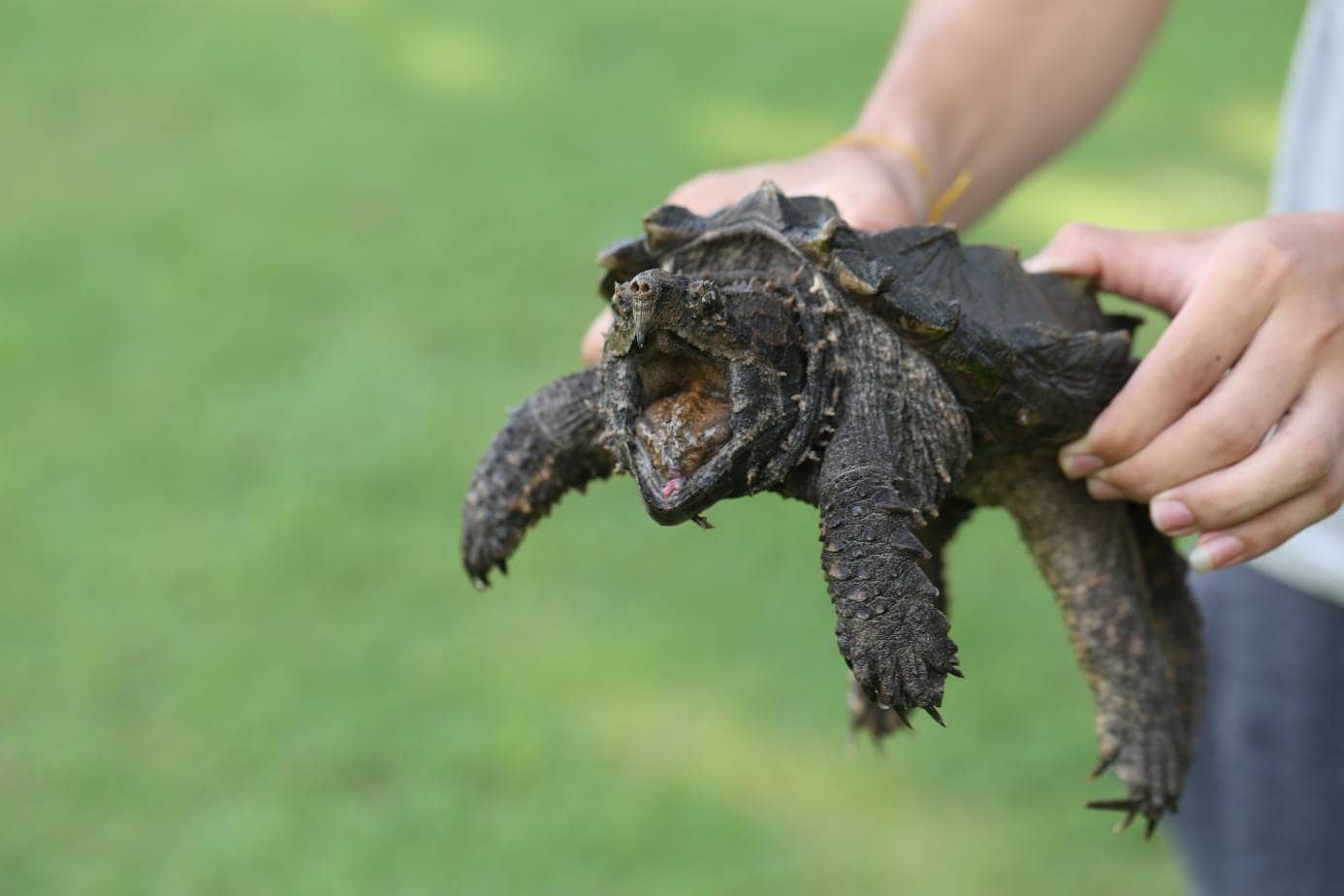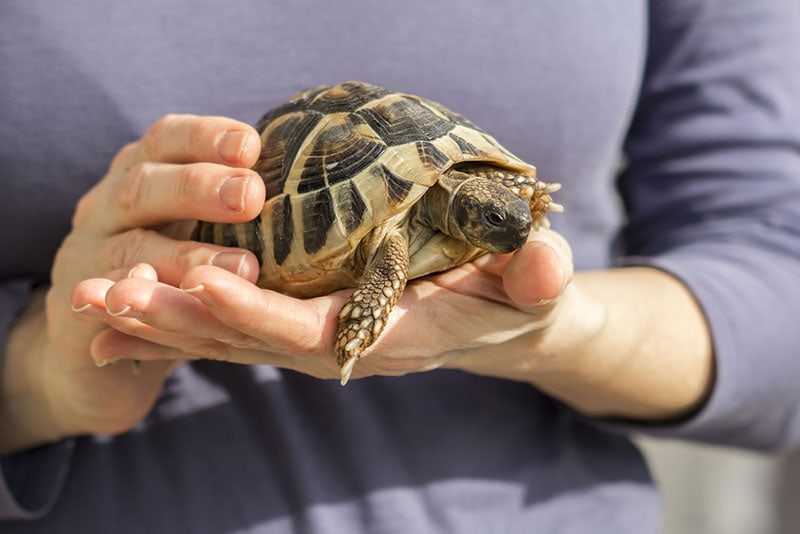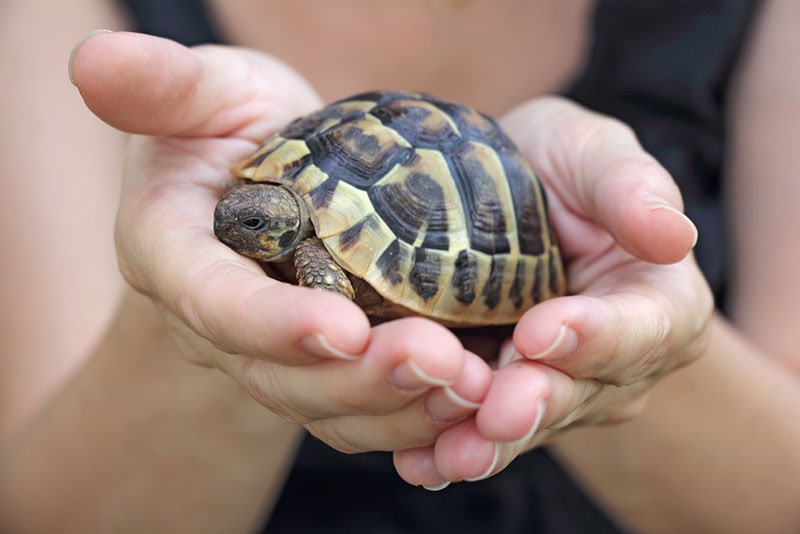
Click to Skip Ahead
Turtles are often touted as being slow, docile creatures but like most animals, they can and will bite under certain circumstances. After all, where do you think the snapping turtle got its name? Though certain species are more prone to biting than others, any type of turtle is capable of biting.
In this article, we’ll talk more about what would cause a turtle to bite, tips on how to avoid being bitten, and we’ll also answer some frequently asked questions that pop up about being bitten by one of these incredible animals.
Why Would a Turtle Bite?
We’ve established that turtles can and will bite, so now let’s explore the reasons why a turtle may bite a human:
The Turtle Feels Threatened
The most common reason why a turtle would bite is because they feel threatened. Most animals will try and defend themselves if they feel they are in danger and do not have a way to easily escape. In the wild, turtles can easily fall victim to predators, so they must remain on guard when something larger and potentially dangerous comes too close.
Wild turtles are much more likely to bite in self-defense than captive pet turtles, but it’s not unusual for a pet turtle to chomp down on its keepers, either. This is especially true for pet turtles that have not had much handling and are not yet used to human contact. Truthfully, handling can cause significant stress to most reptiles so keepers must do their part to help their animal feel more comfortable in the presence of humans.

The Turtle Is Hungry
A hungry turtle will often not have much trouble distinguishing a human finger and their typical food items, but if you are hand feeding, you could easily get bitten by a turtle that is anxious to put something in its belly. This is true for most animals when hand feeding, so it’s not just turtles that get excited for food and accidentally bite.
Regardless of whether a turtle is captive or wild, they are opportunistic eaters that are always ready to chow down. This type of bite is not intentional and can easily be avoided with proper handling and feeding practices.
Tips for Avoiding a Turtle Bite
Not wanting to risk getting bitten by a turtle? We don’t blame you, so here are some tips to avoid getting bitten altogether.
Avoid Hand Feeding
As mentioned above, bites can easily happen when hand-feeding any animal. To avoid being bitten by a turtle, avoid hand feeding altogether. You shouldn’t be feeding wild turtles in the first place, but for pet turtles, it’s a good idea to get their food prepared and then place it safely within the enclosure and allow them to eat directly from their food bowl.

Practice Safe Handling
Turtles aren’t pets that will be handled often, but when you do need to pick them up, you need to do so in a way that is not only safe for you but also safe for the turtle. The same goes for any wild turtles if you find yourself in a situation that makes handling necessary.
Always approach the turtle from behind and gently grasp along the shell edge near the midpoint of the body unless you are dealing with a snapping turtle or soft-shelled turtle. This gives you a firm hold on the shell but allows your hands to remain a safe distance from the mouth. Never pick a turtle up by the tail.
Wild snapping turtles and softshell turtles are known for being more defensive, combative, and prone to biting. They can easily reach around and inflict a painful bite if held at the midpoint of the body and it’s recommended that only experienced handlers pick up these particular species.
In the event that you must urgently move a snapper or softshell, it’s a good idea to guide them rather than pick them up, if possible. If you must touch them, try to hold them by a rear leg while supporting their underbelly.
How to Pick Up a Turtle
To pick up a turtle, approach from behind, and grab the back half of the shell, holding it with your thumbs on the top and fingers on the bottom. Firmly grip the turtle on the top of its shell, just above each of its back legs to support its weight, and keep in mind that some species get really heavy, especially snappers.
Use extreme caution to prevent the turtle from inflicting a powerful bite. If there’s help around, utilize it. Also keep in mind that many turtles will empty their bladder when lifted off the ground, especially wild turtles, so you must be extra careful not to drop them if they do. Again, we don’t recommend handling wild snapping turtles or wild softshell turtles without an experienced handler.
Choose Captive Bred Pet Turtles
When bringing home a new pet turtle, we strongly recommend getting a captive-bred specimen. There are plenty of downfalls to taking wild-caught reptiles into captivity, one being that wild specimens are more likely to bite in self-defense. Captive-bred turtles can still be stressed by the presence of humans, but when born in captivity they have been exposed to humans since hatching.

FAQ
Do Turtles Have Teeth?
No, turtles do not have teeth but instead have beaks, much like birds. Carnivorous species will have a sharp, hooked beak that is used to snatch and kill prey while herbivorous turtles have more broad, flat beaks that are ideal for crushing up plants.
Just because turtles don’t have teeth, doesn’t mean they can’t inflict a serious bite. Certain species like snapping turtles have incredibly powerful jaws that can result in serious damage.
What Happens If a Turtle Bites You?
If you are bitten by a turtle but it doesn’t break the skin, you can typically just wash the area thoroughly with soap and water and call your doctor if you have any concerns.
If a turtle bites you and breaks the skin, you will most certainly want to reach out to your doctor for further guidance and treatment, as turtles are known for carrying salmonella and other bacteria, which could lead to further infection.
While serious bites are rare, they can happen. In the event of a serious bite that indicates a bone could be broken, causes significant blood loss, or is in a particularly vulnerable part of the body, you should seek medical attention right away.

Do Turtle Bites Hurt?
Depending on the turtle’s size and species, and the severity of the bite, a bite from a turtle can most certainly hurt. Most bites typically don’t break the skin and aren’t too bad, but if you have any concerns, you should call your doctor for medical advice.
Conclusion
Turtles can most definitely bite, and they typically do so if they feel threatened or accidentally grab your finger during hand feeding. Though wild turtles are much more likely to bite in self-defense, a pet turtle may also bite. Because turtles carry bacteria, you should contact your doctor if you are bitten, and it breaks the skin. You want to ensure you get proper treatment and avoid further complications. The best way to avoid being bitten is by using safe handling and feeding practices whether you are dealing with a wild or captive turtle.
Featured Image Credit: shymar27, Shutterstock







